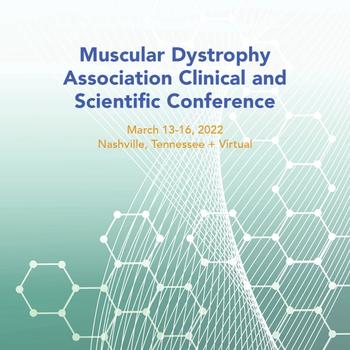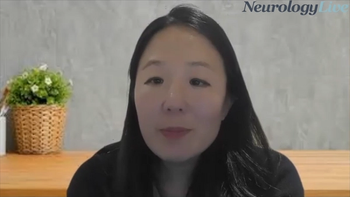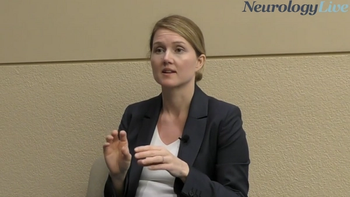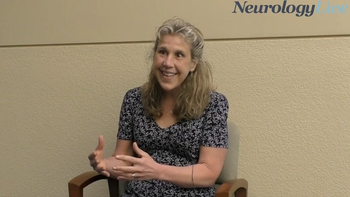
Vamorolone, an investigational agent for Duchenne muscular dystrophy, showed an initial disease-modifying effect that was maintained over a follow-up period of 48 weeks.

Vamorolone, an investigational agent for Duchenne muscular dystrophy, showed an initial disease-modifying effect that was maintained over a follow-up period of 48 weeks.

The division chief of neuromuscular disorders and vice-chair of research at Virginia Commonwealth University offered his insight into the advances in genetic approaches to LGMD. [WATCH TIME: 2 minutes]

The neurologist and assistant professor at the University of Toronto discussed advantages hyperspectral retinal imaging tools like RetiSpec offer and when clinicians can expect to see them in clinical settings.

The 2022 MDA National Ambassador and patient with Bethlem myopathy spoke to the critical need to improve diagnosis delays in neuromuscular disorders and effective communication between patients and their physicians. [WATCH TIME: 2 minutes]

Data may be useful when analyzing disease progression and treatment efficacy in future facioscapulohumeral muscular dystrophy clinical trials.

The treatment was well tolerated at 48 weeks in patients with DMD with a confirmed mutation amenable to exon 45 skipping.

The staff neurologist and medical director of the Barlo Multiple Sclerosis Program at St Michaels Hospital discussed how investigational BTK inhibitors will be used among an ever-growing MS treatment toolbox. [WATCH TIME: 3 minutes]

Part B of the 2-part study will have patients previously on placebo receive SRP-9001 for an additional 52 weeks.

The 2022 MDA National Ambassador and patient with Bethlem myopathy spoke to the importance of including the patient perspective at medical meetings to improve the care paradigm in neuromuscular disorders. [WATCH TIME: 3 minutes]

Individuals on ravulizumab demonstrated statistically significant changes in the primary end point of MG-ADL and in secondary end points such as Quantitative Myasthenia Gravis total score.

At 97 weeks, avalglucosidase alfa showed continued benefit on measures such as forced vital capacity and 6-minute walk test distance and was successful for patients who switched off algucosidase alfa.

Data from the phase 2 NURTURE study of nusinersen (Spinraza; Biogen) suggest that long-term treatment with the agent is beneficial, and point to the importance of newborn screening and early treatment for spinal muscular atrophy.

At months 6, 9, and 12 of treatment with daridorexant—which was recently FDA-approved for insomnia—patients improved on several sleep measures, including subjective total sleep time and daytime functioning.

The neurologist and assistant professor at the University of Toronto provided insight on the clinical use of retinal imaging tools like RetiSpec and the need for further validation of these approaches in Alzheimer disease. [WATCH TIME: 2 minutes]

Speaking on his own presentation on economic burden in MS, Bruce Bebo, PhD, further shared his thoughts on areas of unmet need and the potential relationship of Epstein-Barr virus and MS.

A systematic literature review of randomized controlled trials in neuromyelitis optica spectrum disorder was performed, with 7 studies identified and 2 used in analyses.

Investigators noted the long-term cost-effectiveness and safety of this approach, as it does not require the regular use of disease-modifying therapies.

The Muscular Dystrophy Association's annual meeting will take place in-person and virtually in Nashville, Tennessee, on March 13-16, with more than 950 in-person attendees and 130 presenters.

The staff neurologist and medical director of the Barlo Multiple Sclerosis Program at St Michaels Hospital provided insight on the tolebrutinib’s mechanism of action, and new data presented at ACTRIMS Forum 2022. [WATCH TIME: 4 minutes]

Bruce Bebo, PhD, outlined findings from a recent analysis presented at ACTRIMS Forum 2022, with investigators concluding costs associated with the disease have previously been underestimated.

The staff neurologist and medical director of the Barlo Multiple Sclerosis Program at St Michaels Hospital provided insight on the use of biomarkers to improve management of RIS and uncover more as it relates to MS.

Data provide an update to the post-approval safety profile of cladribine tablets in patients with relapsing MS in reference to COVID-19 infections.

The staff neurologist and medical director of the Barlo Multiple Sclerosis Program at St Michaels Hospital discussed the lack of guidelines for patients with RIS and the research efforts needed going forward to establish them.

Previously reported data show patients with multiple sclerosis treated with anti-CD20s have reduced response to COVID-19 vaccines, but there has been limited research on MS outcomes among vaccinated patients.

The staff neurologist and medical director of the Barlo Multiple Sclerosis Program at St Michaels Hospital discussed her presentation at ACTRIMS Forum 2022 involving imaging biomarkers of RIS/MS prodrome. [WATCH TIME: 4 minutes]

The staff neurologist at Cleveland Clinic’s Mellen Center for Multiple Sclerosis Treatment and Research discussed the results of a new study on age and sex as determinants of autoimmune encephalitis. [WATCH TIME: 3 minutes]

Investigators noted the need for more transformational treatments to improve disability for patients with both primary and secondary progressive multiple sclerosis.

Data suggest that there is a greater cognitive benefit for patients with higher levels of baseline neurological disability treated with the training and transcranial direct current stimulation.

The professor of neurology at the NYU Grossman School of Medicine discussed her presentation at ACTRIMS Forum 2022, which showed better cognitive outcomes in MS following treatment with tDCS. [WATCH TIME: 3 minutes]

The assistant professor of neurology at the University of Pennsylvania provided insight on a new way to accurately predict chronic active lesion evolution from newly developing MS lesions using 7T MRI.